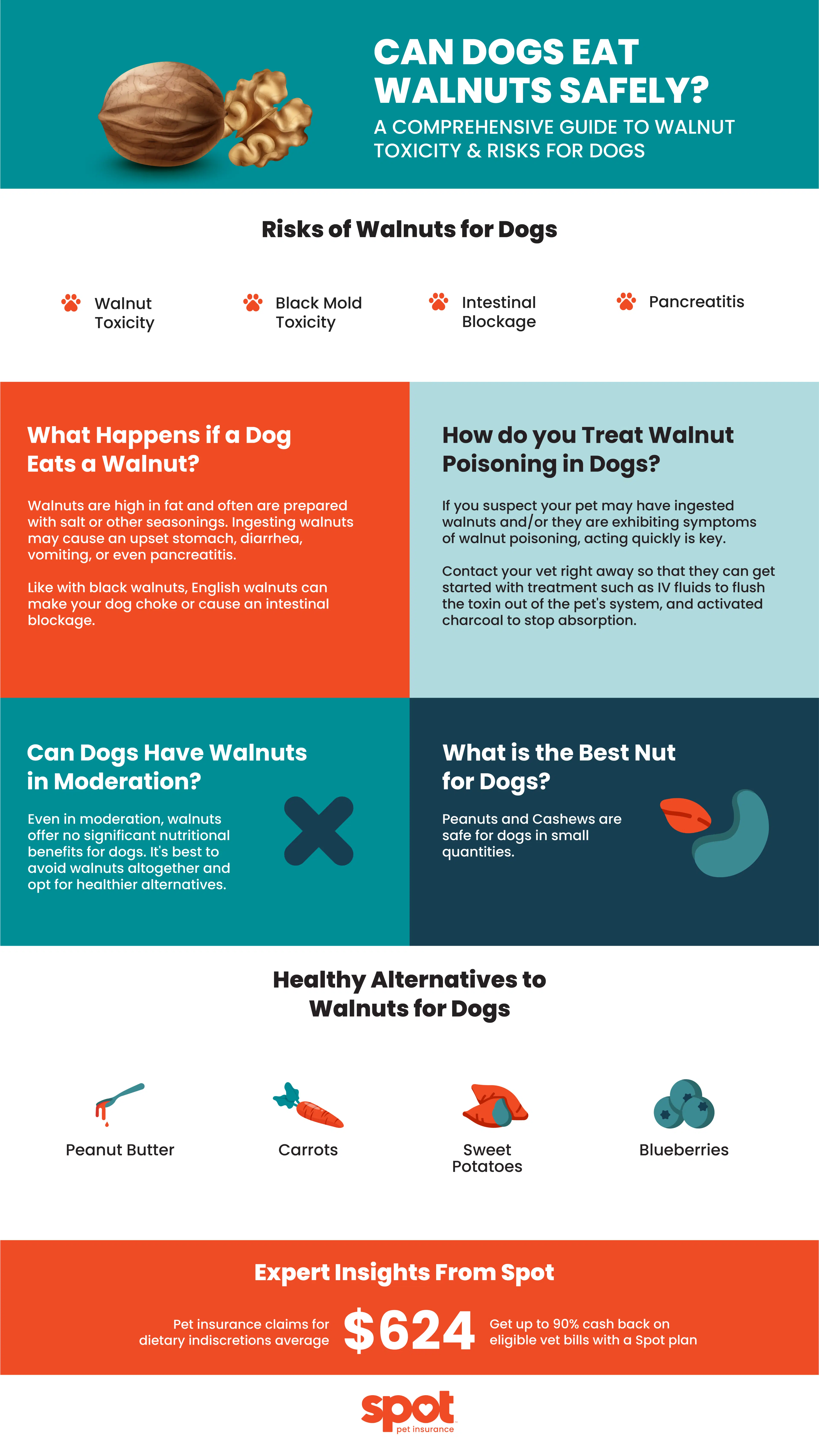Walnuts are a popular snack for humans, packed with nutrients like healthy fats, protein, and fiber. However, when it comes to our canine companions, the question "can dogs eat walnuts?" requires a more cautious answer. While not entirely off-limits, there are significant risks and considerations to understand before sharing this nut with your furry friend.
Can Dogs Eat Walnuts?
In short, it's best to avoid giving walnuts to dogs. While a small amount of plain, unsalted walnuts may not cause immediate harm, the risks associated with their consumption far outweigh any potential benefits.1

Risks of Walnuts for Dogs
Walnut Toxicity in Dogs
Walnuts, particularly black walnuts, can be toxic to dogs. Black walnuts contain a toxin called juglone, which can cause vomiting, diarrhea, and neurological symptoms in dogs.2 Even English walnuts, the type commonly found in stores, can cause health problems due to their high fat content and the potential for mold growth.
Black Mold Toxicity
Walnuts are prone to developing mold, especially when stored in humid conditions. This mold can produce tremorgenic mycotoxins, which are highly toxic to dogs and can cause tremors, seizures, and other neurological issues.1
Intestinal Blockage
Walnuts can pose a choking hazard for dogs, especially in smaller breeds.2 If swallowed whole, they can also cause intestinal blockages, which could require emergency surgery.
Pancreatitis
The high-fat content in walnuts can trigger pancreatitis in dogs, a serious inflammation of the pancreas. Symptoms include vomiting, diarrhea, abdominal pain, and lethargy.2
What Happens if a Dog Eats a Walnut?
Walnuts are high in fat and often are prepared with salt or other seasonings. Because of this, ingesting more than a few English walnuts may cause an upset stomach, diarrhea, vomiting, or even lead to pancreatitis. Like with black walnuts, English walnuts can make your dog choke or cause an intestinal blockage.2
How do You Treat Walnut Poisoning in Dogs?
If you suspect your pet may have ingested walnuts and/or they are exhibiting symptoms of walnut poisoning, acting quickly is key. Contact your vet right away so that they can get started with treatment such as IV fluids to flush the toxin out of the pet's system, and activated charcoal to stop absorption.
Can Dogs Have Walnuts in Moderation?
Even in moderation, walnuts offer no significant nutritional benefits for dogs that cannot be obtained from other, safer food sources. It's best to avoid walnuts altogether and opt for healthier alternatives.
Will One Walnut Hurt My Dog?
While a single walnut may not be immediately toxic, it's important to remember that every dog is different. Some dogs may be more sensitive to the toxins or fats in walnuts, while others might experience no ill effects. However, the risks associated with walnuts are simply not worth taking, especially when there are plenty of safer and healthier options available.
What is the Best Nut for Dogs?
Peanuts, which are technically in the legume family, are typically safe for dogs in very small quantities, as long as they are unsalted and unseasoned. Cashews are also reportedly safe in small quantities, but both cashews and peanuts are too high in fat to make regular dog treats.1
What to Do if Your Dog Eats Walnuts
If your dog accidentally ingests walnuts, monitor them closely for any signs of illness, such as vomiting, diarrhea, lethargy, or loss of appetite. If you notice any of these symptoms, or if your dog ate a large quantity of walnuts, contact your veterinarian immediately.
Expert Insights From Spot
While sharing our favorite foods with our pets can be tempting, it's important to remember that not all human foods are safe for dogs. Spot's internal data shows that pet insurance claims for dietary indiscretions average $642*, highlighting the importance of caution and research before sharing snacks with your pet.
Healthy Alternatives to Walnuts for Dogs
Instead of walnuts, consider these healthier and safer options for your dog:
Peanut Butter (Unsalted and Xylitol-Free): A tasty source of protein and healthy fats.
Carrots: Crunchy and low in calories, a great alternative for chewing and dental health.
Apples (Without Seeds): A good source of fiber and vitamins.
Sweet Potatoes: Rich in nutrients and easy to digest.
Blueberries: Packed with antioxidants and low in calories.
Conclusion
While walnuts may seem like a harmless snack for humans, they are not a safe or healthy option for dogs. The risks of toxicity, intestinal blockage, and other health problems outweigh any potential benefits. Opt for safer and healthier alternatives to ensure your furry friend stays happy and healthy. Remember, always consult your veterinarian if you have any concerns about your dog's diet or if they have ingested something potentially harmful.

With 10 years of experience as a pet parent, I aim to empower pet owners with insights into pet insurance and maintaining their pet's well-being. I aspire to be a trusted source, combining knowledge with a commitment to the welfare of our beloved pets.
*Jan 2019 to Aug 2024 administrator claims data.
Dr. Kate Boatright. "Can dogs eat walnuts? Here’s everything you need to know." Pawlicy Advisor, n.d., https://www.pawlicy.com/blog/can-dogs-eat-walnuts/.
Maharaj, N. "Can dogs eat walnuts?" American Kennel Club, 2022, Nov. 16, https://www.akc.org/expert-advice/advice/can-dogs-eat-walnuts/.
The information presented in this article is for educational and informational purposes only and does not constitute or substitute for the advice of your veterinarian.












